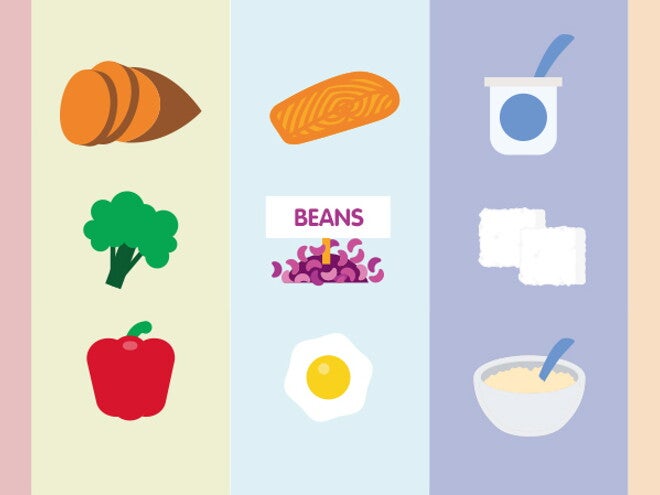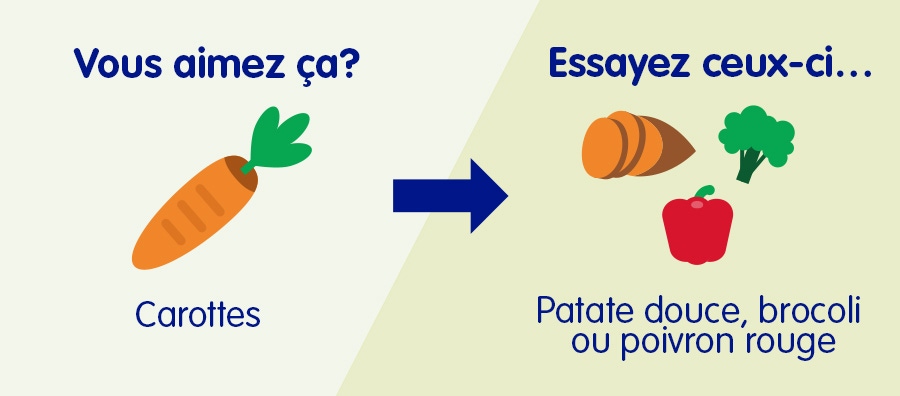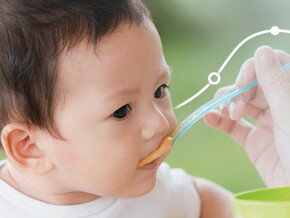
Mélangez le menu !
Il est facile de prendre l'habitude de proposer à votre bébé les mêmes aliments tous les jours, surtout si vous savez qu'il les mangera avec plaisir. Voici quelques idées simples pour enrichir son alimentation sans compromettre ses nutriments essentiels.
Cinq groupes alimentaires
Variété, équilibre et essais répétés sont les clés d'une alimentation saine pour votre bébé. Proposez-lui chaque jour des aliments de chacun des cinq groupes et assurez-vous qu'il ait l'occasion de découvrir différentes textures.

1. FRUITS

Sucrées et faciles à écraser, même avec peu ou pas de dents, les bananes sont sans surprise les fruits préférés des bébés à l'échelle mondiale. Excellent choix nutritionnel, elles sont riches en potassium, un élément essentiel au bon fonctionnement des muscles et des cellules nerveuses de votre bébé.
Mélangez-le: Offrez plus de variété à votre bébé en remplaçant les bananes par du melon cantaloup, des fraises ou des oranges, tous des héros de la santé riches en potassium.
2. LÉGUMES

Les carottes sont un véritable régal pour les petits ventres et sont récemment arrivées en tête des légumes les plus consommés par les bébés de 6 à 12 mois. Vous pouvez leur proposer des carottes cuites de différentes manières, en purée ou en petits morceaux. Elles sont riches en bêta-carotène, un antioxydant que l'organisme de votre bébé transforme en vitamine A. Cette vitamine est essentielle à la bonne santé de sa vue.
Mélangez-le: Servez des patates douces, des poivrons rouges ou du brocoli à la place des carottes au moment des repas et vous continuerez à offrir à votre bébé une source de vitamine A essentielle.
3. ALIMENTS À BASE DE VIANDE/POISSON/PROTÉINES

La volaille, comme le poulet ou la dinde, est un aliment populaire auprès de nombreux débutants, et aussi auprès du reste de la famille. Facile à cuisiner, elle peut être préparée de multiples façons et servie dans divers plats. La volaille est une bonne source de protéines, qui contribuent à la croissance de votre bébé et à la santé de ses os, muscles, sang, peau, cheveux et organes.
Mélangez-le: La prochaine fois que vous irez faire les courses, privilégiez le saumon, les haricots ou les œufs à du poulet. Les haricots et les œufs sont d'excellentes sources de protéines végétales, tandis que le saumon, riche en protéines, a l'avantage de contenir du DHA, un aliment qui favorise le développement cérébral de votre enfant.
4. GRAINS

Moelleuses et faciles à saisir par les petits doigts, les pâtes sont un aliment très apprécié de nombreux bébés. Rapides à cuire, elles se dégustent chaudes ou froides, avec ou sans sauce. Les pâtes sont également riches en vitamines B et en fibres (si vous choisissez des pâtes complètes). Les vitamines B transforment les aliments de votre bébé en énergie, et les fibres facilitent sa digestion.
Mélangez-le: Avant de mettre automatiquement des pâtes dans votre plat, pensez à d'autres céréales complètes, comme le boulgour, le quinoa ou le riz complet, pour varier les plaisirs. Votre bébé appréciera peut-être ces textures légèrement différentes, tout en conservant les vitamines B et les fibres essentielles à son alimentation.
5. Laitière

Coupé en dés pour les petits doigts, le fromage est un aliment de base pour de nombreux bébés. Il apporte à votre tout-petit de nombreux nutriments essentiels, dont le calcium, qui contribue à la formation de ses os et de ses dents.
Mélangez-le: Les fromages à pâte molle, comme la feta ou le fromage blanc, constituent une excellente alternative aux fromages plus durs comme le cheddar, à condition qu'ils soient pasteurisés. Ils permettent à votre bébé de goûter à différentes textures sans se priver de calcium, essentiel à la formation des os. Le yaourt nature est une autre bonne source de calcium.
Sources
Duyff, RL (2017). Académie de nutrition et de diététique. Guide complet sur l'alimentation et la nutrition. (5th ed.). Boston, MA: Houghton Mifflin Harcourt.
Shelov SP & Altmann TR (Eds.). (2009). AAcadémie américaine de pédiatrie. Le guide complet et officiel : Prendre soin de votre bébé et de votre jeune enfant, de la naissance à 5 ans. (5th ed.). USA: Bantam Books.





















